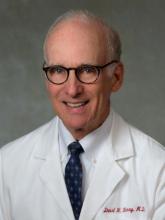Matt Kalaycio, MD, of the Cleveland Clinic joins Blood & Cancer host David H. Henry, MD, of Pennsylvania Hospital, Philadelphia, to preview the potentially practice changing research that will be reported at the 2019 annual meeting of the American Society of Hematology.
Plus, in Clinical Correlation, Ilana Yurkiewicz, MD, of Stanford (Calif.) University, addresses the isolation that comes from dealing with a serious chronic illness, especially around the holidays.
* * *
Help us make this podcast better! Please take our short listener survey: https://www.surveymonkey.com/r/podcastsurveyOct2019
* * *
FDA approves atezolizumab combo as first line for advanced NSCLC
By Laura Nicolaides
The Food and Drug administration as approved atezolizumab in combination with paclitaxel and carboplatin chemotherapy for first-line treatment of adults with metastatic, nonsquamous non-small cell lung cancer with no EGFR or ALK genomic tumor aberrations.
* * *
ASH abstracts discussed in the podcast:
Abstract 1: Post-transplantation cyclophosphamide after allogeneic hematopoietic stem cell transplantation: Results of the prospective randomized HOVON-96 trial in recipients of matched related and unrelated donors.
Abstract 261: Superior survival with post-remission pediatric-inspired chemotherapy compared to myeloablative allogeneic hematopoietic cell transplantation in adolescents and young adults with Ph-negative acute lymphoblastic leukemia in first complete remission: Comparison of CALGB 10403 to patients reported to the CIBMTR.
Abstract 322: Nonmyeloablative allogeneic transplantation confers an overall survival benefit with similar nonrelapse mortality when compared with autologous stem transplantation for patients with relapsed follicular lymphoma.
Abstract 6: Mosunetuzumab induces complete remissions in poor prognosis non-Hodgkin lymphoma patients, including those who are resistant to or relapsing after chimeric antigen receptor T-cell therapies, and is active in treatment through multiple lines.
Abstract LBA-5: Validation of BCL11A as therapeutic target in sickle cell disease: Results from the adult cohort of a pilot/feasibility gene therapy trial inducing sustained expression of fetal hemoglobin using posttranscriptional gene silencing.
Abstract LBA-6: Carfilzomib, dexamethasone, and daratumumab versus carfilzomib and dexamethasone for the treatment of patients with relapsed or refractory multiple myeloma: Primary analysis results from the randomized, open-label, phase 3 study Candor.
Abstract 1588: A randomized trial of EPOCH-based chemotherapy with vorinostat for highly aggressive HIV-associated lymphomas: Updated results evaluating the impact of diagnosis-to-treatment interval and pre-protocol systemic therapy on outcomes.
Abstract 940: Elucidating the role of IL6 in stress erythropoiesis and in the development of anemia under inflammatory conditions.
Abstract 57: Patient harm from repetitive blood draws and blood waste in the ICU: A retrospective cohort study.
Abstract 59: Impact of iron supplementation on patient outcomes in women undergoing gynecologic procedures: Systematic review and meta-analysis of randomized trials.
Abstract 126: Polatuzumab vedotin plus obinutuzumab and lenalidomide in patients with relapsed/refractory follicular lymphoma: Primary analysis of the full efficacy population in a phase Ib/II trial.
Abstract 168: Risk of hemorrhage in patient with polycythemia vera exposed to aspirin in combination with anticoagulants: Results of a prospective, multicenter, observational cohort study (REVEAL).
Abstract 326: Safety and effectiveness of apixaban, LMWH, and warfarin among venous thromboembolism patients with active cancer: A retrospective analysis using four U.S. claims databases.
Abstract 327: Safety and effectiveness of apixaban, LMWH and warfarin among venous thromboembolism patients with active cancer: A subgroup analysis of VTE risk scale.
Abstract 566: Phase II study of oral rigosertib combined with azacytidine as first line therapy in patients with higher-risk myelodysplastic syndromes.
For more MDedge Podcasts, go to mdedge.com/podcasts
Email the show: podcasts@mdedge.com
Interact with us on Twitter: @MDedgehemonc
David Henry on Twitter: @davidhenrymd
Ilana Yurkiewicz on Twitter: @ilanayurkiewicz

